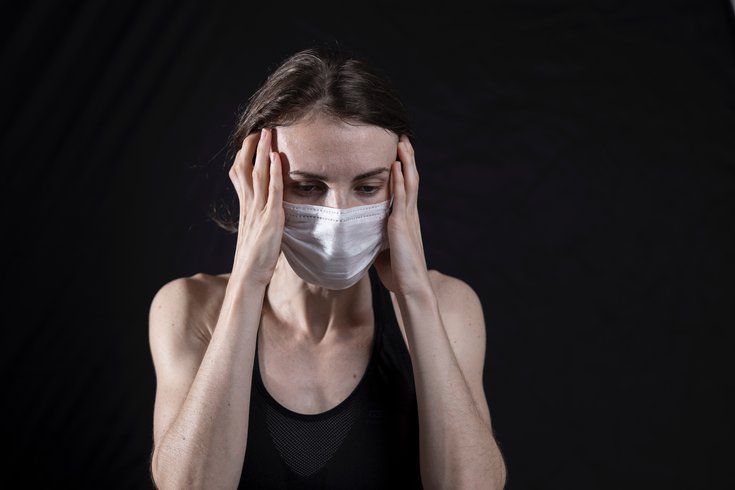
October 15, 2021
 Engin Akyurt/Unsplash
Engin Akyurt/Unsplash
Almost 1 in 4 COVID-19 survivors have difficulty with concentration in the months afterward and nearly 1 in 3 have been diagnosed with a generalized anxiety disorder, according to a Penn State study.
When people first began reporting lingering symptoms from COVID-19, such cases appeared to be limited to a small percentage of survivors.
More than 18 months into the pandemic, data now suggests a large percentage of COVID-19 survivors, including children, need additional care for an array of psychological and physical symptoms.
Not many studies have evaluated patients' health after recovering from the coronavirus. Early reports suggested that up to 30% of survivors might experience so-called "long COVID," or Post-COVID syndrome.
A recent Penn State study found that more than half of people diagnosed with COVID-19 will experience symptoms up to six months after their infections end. Researchers also observed a more extensive list of symptoms than first associated with Post-COVID syndrome.
Initially, the most common lingering symptoms reported were fever, shortness of breath, depression, myalgia and damage to the heart, lungs and vascular system.
The researchers observed several trends among the survivors including:
•One in 5 survivors experienced a decrease in mobility.
•Almost 1 in 4 survivors have difficulty with concentration.
•Nearly 1 in 3 patients were diagnosed with a generalized anxiety disorder.
•Difficult breathing and chest pain and palpitations were common among survivors.
•Hair loss, rashes and digestive issues such as vomiting, diarrhea and loss of appetite also were frequently reported.
The researchers said public health officials and health systems should prepare to meet the unique needs of these patients, whose lingering symptoms often include fatigue, difficulty breathing, chest pain, sore joints and loss of taste or smell.
"The burden of poor health in COVID-19 survivors is overwhelming," said Dr. Paddy Ssentongo, assistant professor at the Penn State Center for Neural Engineering. "Among these are the mental health disorders. One's battle with COVID doesn't end with recovery from the acute infection. Vaccination is our best ally to prevent getting sick from COVID-19 and to reduce the chance of 'long COVID' even in the presence of a breakthrough infection."
The study reviewed worldwide data on unvaccinated patients recovering from COVID-19 to better understand the short- and long-term health effects of the infection. The review included 57 reports and data on 250,351 people who were diagnosed with COVID-19 from December 2019 through March 2021.
"Although previous studies have examined the prevalence of 'long COVID' symptoms among patients, this study examined a larger population, including people in high-, middle- and low-income countries, and examined many more symptoms. Therefore, we believe our findings are quite robust given the available data," said Vernon Chinchilli, chair of Penn State's public health sciences department.
Ssentongo noted the study was not designed to confirm COVID-19 as the direct cause of these symptoms so there may be other causes associated with these symptoms, too.
The cause of lingering symptoms in COVID-19 survivors is still not fully understood. It could be the result of an overstimulated immune system, reinfection or an increased production of antibodies that attack the body's own tissues.
Because the coronavirus can live in the nervous system, neurological symptoms such as taste or smell disorders, memory impairment and decreased attention and concentration can linger.
Early intervention is critical for the best long-term outcomes for these survivors, researchers said. Health care providers need to prepare now to ensure they have the right resources to treat these patients.
"Since survivors may not have the energy or resources to go back and forth to their health care providers, one-stop clinics will be critical to effectively and efficiently manage patients with 'long COVID,'" Ssentongo said. "Such clinics could reduce medical costs and optimize access to care, especially in populations with historically larger health care disparities."
Penn Medicine and other health care systems in the Philadelphia area have opened post-COVID recovery clinics.
Penn's Post COVID-19 Assessment and Recovery Clinic first assesses patients to determine their individual health and rehabilitation needs, including screenings to assess organ function. Then patients are referred to specialists for their specific health issues. Penn also has created a registry to track important clinical characteristics to advance research on Post-COVID syndrome.
The Penn State study was published in JAMA Network Open.
Most of the patients studied lived in high-income countries. About 79% of them had been hospitalized with COVID-19. The median age was 54 and the majority were men. Each patient's health was analyzed at three points after recovery – one month, two-to-five months and six or more months.